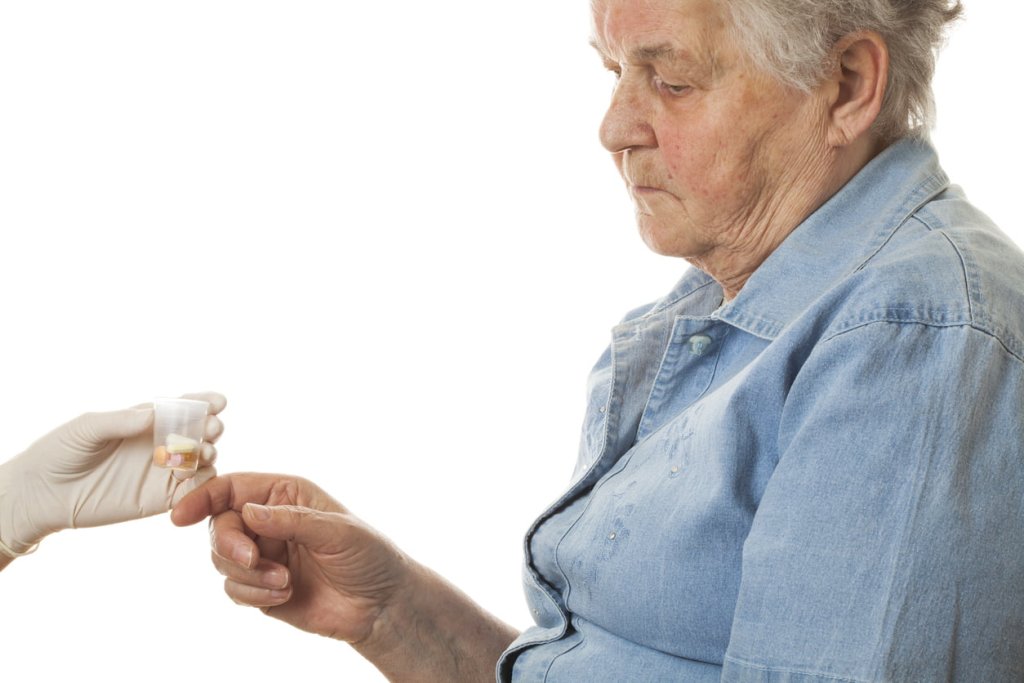In this blog for our dementia series (#dementiaspotlight), geriatrician Kit Byatt considers the state of the evidence on drug withdrawal in people with dementia.
Page updated 18 August 2022 and last checked 14 March 2023
As a practising geriatrician I am fascinated by the challenge of over-enthusiastic medication in older people, especially in those who are frail. I teach our junior doctors the equation:
multimorbidity x therapeutic enthusiasm = polypharmacy
I recently joined a GP colleague in his weekly visit to a local nursing home [NH]. We had discussed the problem of prescribing for frail patients with multiple diseases and we decided to undertake some reflective Continuing Professional Development together.

Too many medicines?
Multiple medications are common in NH residents. That said, there is no one agreed definition of polypharmacy, both qualitative and quantitative definitions being used by different groups.[i] A session lasting a couple of hours effortlessly generated twenty topics, ranging from the management of acuteA health condition (or episodes of a health condition) that comes on quickly and is short-lived. gout, via diagnosing dehydration, through to what might be the correct dose of loop diuretic in a patient with impaired kidney function.
Many of these residents had been on a cocktail of medications started many months or years earlier, by another practitioner. The rationale, and specific riskA way of expressing the chance of an event taking place, expressed as the number of events divided by the total number of observations or people. It can be stated as ‘the chance of falling were one in four’ (1/4 = 25%). This measure is good no matter the incidence of events i.e. common or infrequent./benefit analysis for the patient in question is rarely evident[ii]. The discussions become more complex when considering patients with dementia, who constitute some 75% of residents[iii], and over half of whom are likely to be on at least 5 medications[iv]. This constitutes a significant challenge.
Cochrane evidence on drug withdrawal
When I found out that two systematic reviewsIn systematic reviews we search for and summarize studies that answer a specific research question (e.g. is paracetamol effective and safe for treating back pain?). The studies are identified, assessed, and summarized by using a systematic and predefined approach. They inform recommendations for healthcare and research. of randomisedRandomization is the process of randomly dividing into groups the people taking part in a trial. One group (the intervention group) will be given the intervention being tested (for example a drug, surgery, or exercise) and compared with a group which does not receive the intervention (the control group). controlled trialsA trial in which a group (the ‘intervention group’) is given a intervention being tested (for example a drug, surgery, or exercise) is compared with a group which does not receive the intervention (the ‘control group’). (RCTs) had recently been published by the Cochrane Dementia and Cognitive Improvement Group, I was excited – maybe I would find the answer to some of my questions!
The first was Statin Withdrawal in People with Dementia(published September 2016) [v] Statins have been a topic stimulating controversy ever since their introduction into practice – initially because of the high cost of prescribing them to the large number of people with cardiovascular risk factors, and latterly because of the debate about their true risk/benefit profile, not least in older patients.[vi] This systematic review set out to: ‘evaluate the effects of withdrawal or continuation of statins in people with dementia on: cognitive outcomesOutcomes are measures of health (for example quality of life, pain, blood sugar levels) that can be used to assess the effectiveness and safety of a treatment or other intervention (for example a drug, surgery, or exercise). In research, the outcomes considered most important are ‘primary outcomes’ and those considered less important are ‘secondary outcomes’., adverse events, behavioural and functional outcomes, mortalitydeath, quality of life, vascular morbidityillness or harm, and healthcare costs.’ The usual main databases were searched for randomised controlled trials. The good news was that the main result was that 28 papers were found. The bad news? All were excluded! This is officially an evidence-free area.

The second review was Antihypertensive withdrawal for the prevention of cognitive decline(published November 2016)[vii] This was more challenging for me, conceptually. I found it difficult to accept the underlying idea that withdrawing antihypertensive therapy for a matter of days or weeks might have a measurable effect on cognition. Given the variability in cognitive testing (for example, the MMSE is reckoned to fall approximately 3-4 points per year[viii]) the ability to be sure of both the validity and the cause of a small change over a short period of time must be very limited. It therefore came as no surprise to me that only two studies – including just under 2,500 patients overall – survived the rigorous Cochrane screening process.
In the first RCT, antihypertensive treatmentSomething done with the aim of improving health or relieving suffering. For example, medicines, surgery, psychological and physical therapies, diet and exercise changes. was withdrawn for a mere 7 days after an acute stroke and cognitive function (using telephone assessments) was measured at 90 days. The cognitive function scores failed to differentiate the groups and the evidence was assessed as being too poor quality (because of risk of biasAny factor, recognised or not, that distorts the findings of a study. For example, reporting bias is a type of bias that occurs when researchers, or others (e.g. drug companies) choose not report or publish the results of a study, or do not provide full information about a study., indirectness and lack of corroboration) to draw any inferences from. In the longer studyAn investigation of a healthcare problem. There are different types of studies used to answer research questions, for example randomised controlled trials or observational studies., treatment was withdrawn for 16 weeks and cognitive function change over that period was assessed. There was no clinically (or statistically) significant difference in the change in cognitive function scores between groups. Sadly, certain prespecified outcomes of interest in the trials (falls, hospitalisation) were not reported.
What have I learnt from this?
Firstly, as suggested in a BMJ editorial 5 years ago, research in this area is woefully inadequate.[ix] This echoes another Cochrane ReviewCochrane Reviews are systematic reviews. In systematic reviews we search for and summarize studies that answer a specific research question (e.g. is paracetamol effective and safe for treating back pain?). The studies are identified, assessed, and summarized by using a systematic and predefined approach. They inform recommendations for healthcare and research., Interventions to improve the appropriate use of polypharmacy for older people (updated September 2018) [x] It managed to accumulate only 12 relevant trials in this field from the world literature. The latter did suggest that inappropriate prescribing could be reduced with appropriate interventions, although the dataData is the information collected through research. were unclear as to whether clinically significantClinical significance is the practical importance of an effect (e.g. a reduction in symptoms); whether it has a real genuine, palpable, noticeable effect on daily life. It is not the same as statistical significance. For instance, showing that a drug lowered the heart rate by an average of 1 beat per minute would not be clinically significant, as it is unlikely to be a big enough effect to be important to patients and healthcare providers. improvement could be achieved in so doing. [Editor’s note: the 2018 update of the review includes 32 studies but it’s still unclear whether interventions to improve appropriate polypharmacy, such as reviews of patients’ prescriptions, resulted in clinically significant improvement).

Secondly, the data we have focuses on quantitative, easily measured outcomes. Patient-centred outcomes are still sadly lacking.[xi] Flagship journals are still reluctant to publish qualitative data. We have a long way to go to overcome biases against patients in clinical trialsClinical trials are research studies involving people who use healthcare services. They often compare a new or different treatment with the best treatment currently available. This is to test whether the new or different treatment is safe, effective and any better than what is currently used. No matter how promising a new treatment may appear during tests in a laboratory, it must go through clinical trials before its benefits and risks can really be known..
There is much to be done. I suspect that real world block randomised withdrawal trials in the NH populationThe group of people being studied. Populations may be defined by any characteristics e.g. where they live, age group, certain diseases. may give us more information than rigorous studies in hospital. External validity (i.e. applicability in the messy real world of clinical medicine) is key in this area, and maybe more important than internal validity (i.e. rigour in controlling as many variables as possible, other than the interventionA treatment, procedure or programme of health care that has the potential to change the course of events of a healthcare condition. Examples include a drug, surgery, exercise or counselling. ). While we wait for these studies, I will continue to work with local primary care colleagues to try to reduce the medication burden on our older, frailer, patients.
Do join in the conversation on Twitter with Kit @Laconic_doc and @CochraneUK or leave a comment here.
Declaration of interest disclosure. Kit Byatt reports: I am chair of trustees of the charity Animal-Free Research (UK) [formerly The Dr Hadwen Trust]. Its core purpose is to fund the development of research methods to replace animal-based experiments, in order to improve scientific rigour and human relevance, as well as reducing unnecessary animal suffering. This is a voluntary, unpaid, position, although some of my expenses are reimbursed.



The aim of drug review in Care Homes is about stopping redundant medication that might be doing more harm than good.In particular this involves things that might cause falls, were supposed to be time-limited, and those whose original purpose can no longer be established.
Until the end of life is in clear sight, antihypertensives might reduce the risk of vascular events, so are harmless or possibly helpful (no evidence). Commonly patients in care homes have lost weight or renal function since these drugs were started, and are taking higher effective doses than in the past, so become hypotensive or have orthostatic hypotension, which may cause falls.
Many are taking psychotropic medications – mostly antidepressants, but also sedatives and antipsychotics, and the need for these needs to be assessed. Not an easy task, and often they are needed even though we know they increase the risks of falls and injury.
There is no easy answer to these questions, and the problems are so heterogenous that I doubt any meaningful study that meets Cochrane criteria will ever be carried out. In the meantime those of us who do the work must fumble our way through the fog of relevant information as best we can.
I am an epidemiologist and psychiatric nurse doing home care for older adults. I am keen to get involved in a trial of drug withdrawal among older patients, especially if they are N-of-1 studies, which I see as precursors for larger trials and great for controlling between-person confounders.
Regarding dementia, I see a glaring need for a small or large trial of ECT for moderate or severe dementia with BPSD. Again I am willing to get involved in this as is my wife who is a retired psychiatrist who has had ECT for BP depression.
Gary Sorock
Thank you. There are several ways for people to get involved in Cochrane’s work. You could contact the Dementia and Cognitive Improvement Group http://dementia.cochrane.org, take a look at the help needed on Cochrane Task Exchange http://taskexchange.cochrane.org or join in with trial identification at Cochrane Crowd http://crowd.cochrane.org/index.html
Sarah Chapman (Editor)